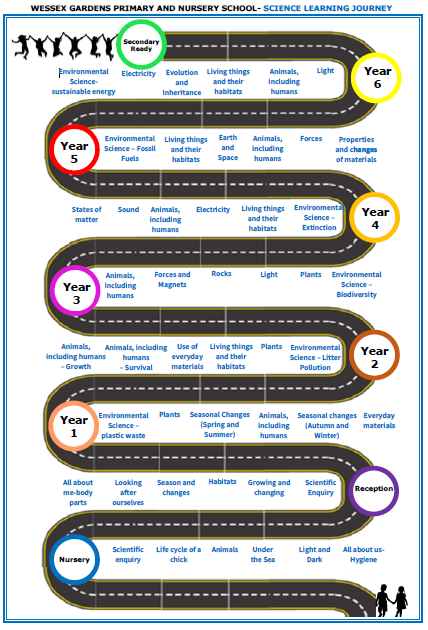Science
"Science in primary education should foster a sense of excitement and curiosity about natural phenomena, encouraging children to ask questions and develop a lifelong love of exploration and discovery."
National Curriculum for Science, Department for Education (DfE)

Intent
At Wessex Gardens, our intent is to provide a broad, balanced, and stimulating Science curriculum that inspires curiosity and fosters a deeper understanding of the world around us. We aim to equip every child not only with the fundamental knowledge and skills required by the Science National Curriculum, but also to prepare them for the opportunities and responsibilities they will encounter in later life. Our curriculum encourages scientific curiosity, questions, and exploration, ensuring that all children can engage with and investigate the wonders of the world.
We are committed to developing scientific skills that will benefit our pupils both in school and beyond, helping them to become confident, independent thinkers. Through practical and hands-on experiences, our pupils will investigate Biology, Chemistry, and Physics, while making connections to other subjects like Geography and History where possible. By engaging children with real-world applications, we aim to nurture a lifelong interest in Science and its relevance to everyday life.
Implementation
Our Science curriculum is carefully planned, sequenced, and tailored to the needs of all learners. Every unit has been designed to build on prior knowledge, ensuring that pupils know and remember more over time. The curriculum is systematic and progressive, offering opportunities for pupils to deepen their understanding of natural phenomena through repeat practice and investigative work. We aim to make scientific concepts accessible for all, especially for disadvantaged children, so they can relate new learning to their own experiences.
Key principles in the delivery of Science at Wessex Gardens include:
-
Practical Experiences: Pupils engage in hands-on, exploratory work to develop practical skills such as prediction, observation, classification, measuring, and data collection. They learn to record and communicate their findings in a variety of formats, such as tables, graphs, diagrams, and photographs.
-
Scientific Enquiry: Pupils learn the methods, processes, and nature of Science through a wide range of enquiry-based activities. This encourages them to question, investigate, and reflect on their own conclusions. The curriculum is designed to challenge their understanding and enable them to question the world around them.
-
Environmental Science: Every year group is taught environmental science in the summer term, allowing pupils to explore the natural world and its ecological challenges. This focus on environmental science is designed to foster a sense of responsibility and curiosity about the planet.
-
Cross-Curricular Links: Wherever possible, Science is taught alongside other subjects like Geography and History, enriching pupils' understanding by demonstrating the real-world applications of scientific concepts. This cross-curricular approach helps pupils make meaningful connections between subjects.
-
Progression and Repetition: The curriculum has been carefully designed to ensure that key scientific concepts are revisited and reinforced each year. By building on previous knowledge, we ensure that pupils develop a secure, long-term understanding that they can apply in future learning. Teachers are confident in providing solid foundations in both scientific knowledge and practical skills, ensuring a smooth progression through the primary years.
-
Focus on Vocabulary and Technical Skills: Throughout each unit, pupils are introduced to and encouraged to use key scientific vocabulary. They will develop the ability to explain concepts, describe processes, and carry out investigations confidently.
Impact
The impact of our Science curriculum at Wessex Gardens is evident in the scientific knowledge, skills, and critical thinking abilities that our pupils develop. By the end of Key Stage 2, pupils will:
-
Have a Strong Scientific Knowledge: Pupils will possess a comprehensive understanding of scientific concepts across Biology, Chemistry, and Physics. They will be confident in explaining scientific phenomena and processes, using the correct terminology and applying their knowledge to everyday situations.
-
Be Independent, Inquisitive Scientists: Pupils will be able to plan and conduct investigations, make predictions, gather data, and analyse results. They will be capable of evaluating their work, explaining their conclusions, and suggesting improvements for future investigations.
-
Retain and Apply Knowledge: The curriculum is designed to ensure that pupils retain key scientific knowledge in their long-term memory. They will have the ability to build on this knowledge year after year, applying what they have learnt to new concepts and challenges.
-
Question and Investigate the World Around Them: Pupils will leave Wessex Gardens with the confidence to question and explore the world scientifically. They will be curious about natural phenomena and eager to investigate and seek explanations.
-
Be Ready for the Future: Pupils will be equipped with the scientific skills and knowledge necessary for future academic and real-world challenges. They will be prepared to engage with the scientific and technological opportunities and responsibilities that will shape their future lives.
Overall, our Science curriculum will have a lasting impact on pupils by not only meeting the statutory requirements of the National Curriculum but also inspiring a passion for Science and fostering skills that will benefit them both academically and personally. Through our carefully planned, practical, and engaging approach, we ensure that pupils leave Wessex Gardens with a deep understanding of the world and the scientific tools to explore it.









